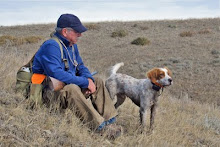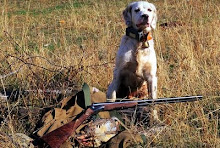 I was reading post and comments on Animal Person - a website for self styled animal folks. Much ado about AR 'issues' and Cass Sunstein in particular. Inevitably there is 'agreement' on the broad goals, and discussion with lots of slicing and dicing of words to get around issues of the animal rights agenda that are inconvenient - namely raising and killing animals for food. Of course, they view hunting as a sport death of animals that should be banned entirely.
I was reading post and comments on Animal Person - a website for self styled animal folks. Much ado about AR 'issues' and Cass Sunstein in particular. Inevitably there is 'agreement' on the broad goals, and discussion with lots of slicing and dicing of words to get around issues of the animal rights agenda that are inconvenient - namely raising and killing animals for food. Of course, they view hunting as a sport death of animals that should be banned entirely.I fail completely to see why one 'use' of animals (Growing them for food and killing them) is somehow morally superior to other means of killing them for food (hunting). There seems to be no rational basis for the distinction - just the 'feeling' that one is necessary and the other is for sport and therefore repugnant. So the objection to hunting seems to be based solely on the idea that it's OK to kill animals (a necessary evil for the maintenance of society), as long as there is no sport involved. Why?
Hunting is a far more honorable and connected way to obtain food than reducing an animal to a plastic wrapped, portion controlled 'product' that excuses the squeamish from their own culpability in the death of the creature it was.









9 comments:
This stuff has always left me shaking my head in disdain. I think the key is in the word 'sport' and the inability or unwillingness (but probably intellectual sloth) to see beyond the emotional strings connected to the word; and see that rationally it makes no difference to the animals.
In fact, if they were to compare the state of things at any major chicken raising farm to the clean kill of sport hunting, some of these folks would be amazed.
I had a friend who ran a Purdue facility and it is one of the most disgusting things that I have ever witnessed.
Bias can be blind.
Nice to see you here, John. And I don't think Mary Martin knows who you are, Mike.
I think one of the challenges is that hunters kill for all kinds of reasons. And while I think some moral mileage can be gained from stipulating that you eat what you kill (unless you're arguing with a vegan PhD.), I think hunters lose credibility by not acknowledging the 'sport'. Now, I hate the word 'sport' in the same way that a lot of AR folks use it against us -- because it implies that taking a life and scoring a touchdown are somehow morally equivalent -- but there should be some way to acknowledge the sense of satisfaction that comes from having killed cleanly despite a bird or animal's best efforts.
To put it in different terms: I hunt because I gain tremendous satisfaction from watching my dogs do what comes so deeply and naturally to them and from the teamwork that it requires to take a bird. If spending hours of training time with your dogs isn't a tremendous sign of respect for the bird you are seeking to kill, then I have no idea what is.
And in some ways, the challenge for hunters isn't Mary Martin at Animal Person -- because as a vegan intellectual she will not be convinced because her moral threshold is set pretty high. The challenge is all the folks in the middle, the folks who rationally know that large-scale commercial meat production is a horror-show, but who still take their politics saran-wrapped off the shelf too. If the only images the average person sees of hunting are those served up by the AR hardcore, then we look pretty bad.
best
A.
I am sure that she does not know who I am. It should not matter.
For me the 'I eat what I kill" statement is not a proper argument. Better is "I get part of my diet - the best part - from things that I kill for myself."
Yes, it's partly about the dogs for many of us. But that tack skirts the core issue... the killing of animals for our own use. SPORT should never be confused with GAME. Hunting is a sport, football is a game. To me, the high ground goes to those who, without apology, do at least some of their own blood work. There is no hypocrisy in this. We need not apologize or parse words.
As for, "... as a vegan intellectual she will not be convinced because her moral threshold is set pretty high." I would rather say that, while she is entitled to her opinions and beliefs, they do not obligate me to subscribe. We are all animals on and of this Earth, and no amount of philosophy or intellectual gymnastics will change that. We cannot divorce ourselves from a million years of evolution.
This is a very thoughtful conversation and I am glad to be able to take part.
An interesting subject to me is that which surrounds the invoking of the notion of 'morals' as it pertains to human choices. Any comparison of moral positions requires some agreement on the point of reference from which morals can be compared. Otherwise, what is left is circular argument around different 'centers' that are largely invisible to the parties involved.
How is it morally acceptable for a lion to kill an antelope and not for a man to kill an antelope.
By what authority does the lion or the man derive.
Without the answer to that question being clear, you have no real satisfaction in the debate.
Very good point, Jhn. I think that the AR urban intellectuals - while considering animals to be sentient beings - would argue that man is a 'moral animal' and should be held to a higher standard.
A brief reading of history would put the lie to that idea.
Your point about morality is on target. Morality is a set of culturally derived values.It follows the that the AR movement at core is cultural colonialism. An urban intellectual conceit. Following that trail will, indeed, leave people chasing their tails.
I'm enjoying this thread so I'll offer my own opinions ...
I try to be aware of my relationship with the rest of the earth and not take any aspect of that relationship for granted. And I try to treat all other elements of the earth (animal, vegetable, or mineral) with a respect that is born in understanding that relationship.
Hunting promotes my healthy relationship with the earth. Easting plastic wrap chicken does not. Senseless killing would not promote that relationship, and unfortunately hunting is someimtes viewed (and practiced!) as senseless killing. Folks shooting captive trophies comes to mind.
I have some liberal but open-minded friends. I have found that I can usually explain this position and at least get them thinking.
Mike,
You sound a bit like an anthropologist. The AR movement certainly is cultural colonialism, isn't it?
So many of the ideas thrust upon us fit that mold. Your use of the term motivated me to reacquaint myself with the meaning of the term.
What a wonderful thing it is for folks to understand the forces that are at play around us.
Thank you
John, I am interested in anthropology.
The AR intellectuals (at least some of them) believe in 'moral absolutism' - that morals are inherent in humans and transcend culture. In this model 'we just know' what is right and what is wrong - convenient for someone arguing from an emotivist POV.
The moral absolutist is an intellectual Nazi - always 'One size fits all' and "My way or the highway'.
The truth is that all morality is shaped by and relative to culture and the society that culture lives in. Were this not so we would all be schizophrenic.
Perhaps the tough part is to recognize that, if we are honest with ourselves, cultural/societal differences are real, and the roots of human conflict.
This is the case here - the 'cultural' differences are shaped by media and worldview - urban ascendancy dominating the nation's culture. We are no longer a nation of farmers living close to the land. We are a nation of city dwellers who form opinions about how things are in the world through second hand (often re-crafted) information. To the urban cultural elitist the hunter or other 'connected' person seems to be an anachronism.
Yes, and those urban elitists will continue to consider those who are connected, as lesser folks until such time as they come to need those skills necessary to life outside the bubble.
A study of the move from a large base agrarian society to a small base industrial one is interesting.
That and tracking industrialism and capital and its effects on the cultures. A lot of good, but room for a lot of mischief as well.
But I've digressed.
Post a Comment